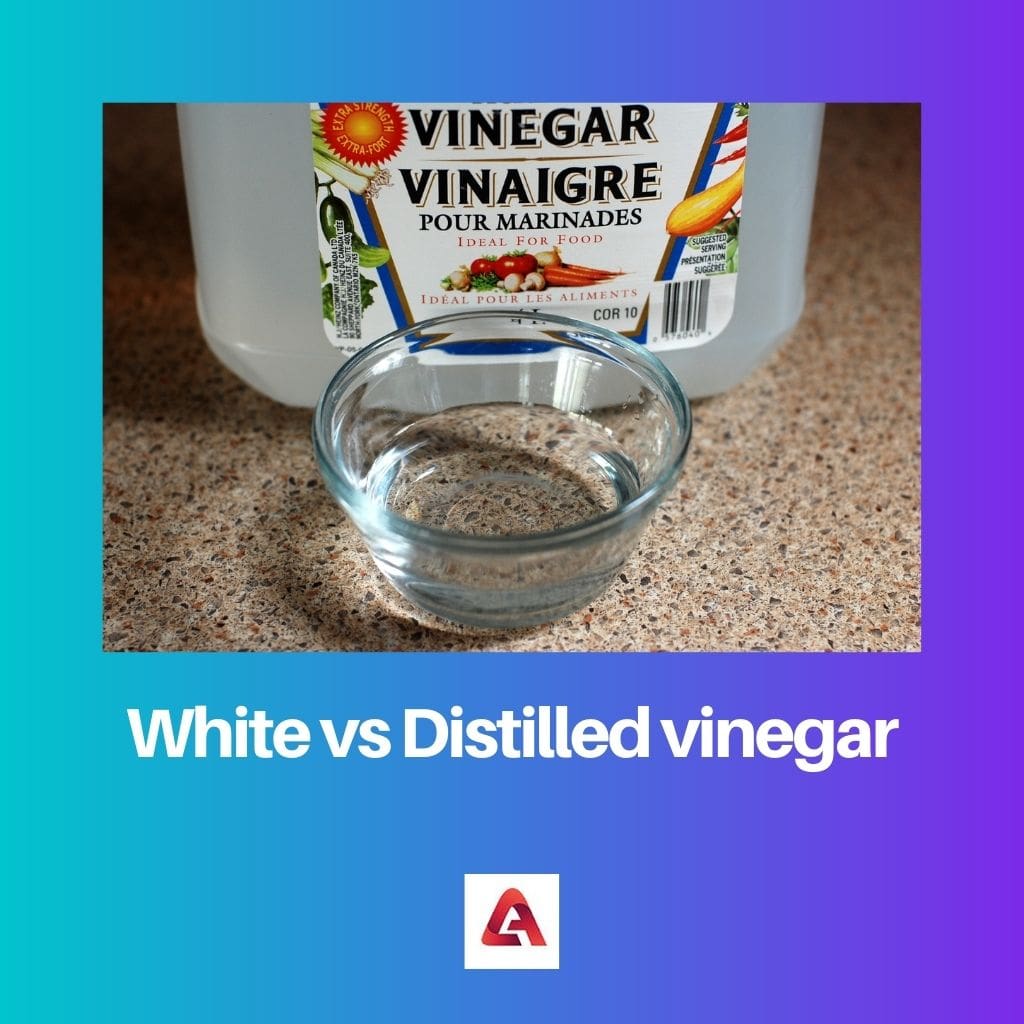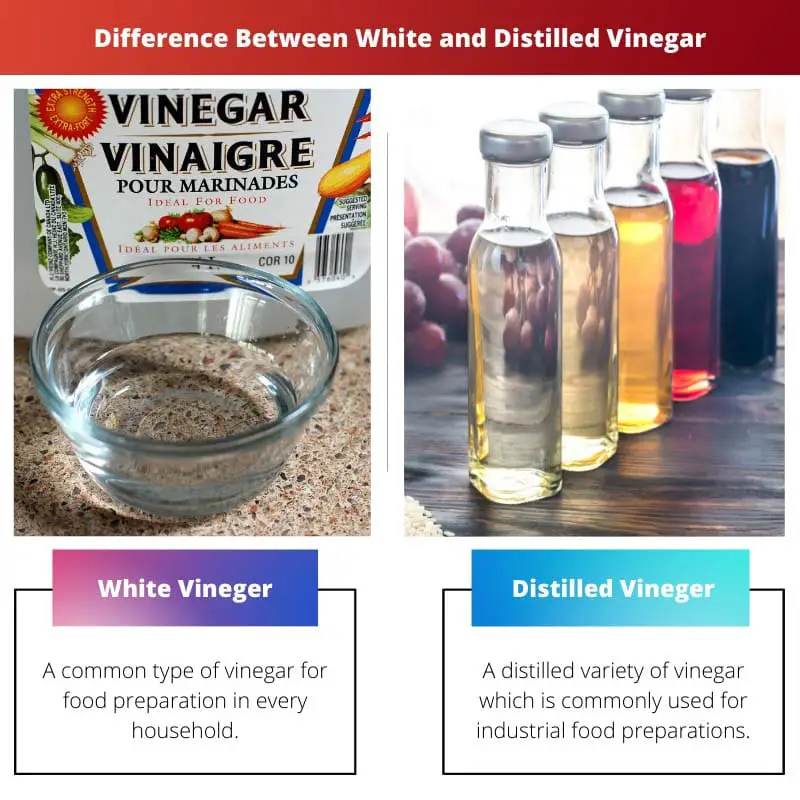Vinegar is a common household item that can be found in every kitchen. This ingredient plays a vital role in every cooking and house cleaning.
From various historical documents, it has been established that vinegar-making is as old as alcoholic brewing. For a long time, mankind has used vinegar for culinary and medicinal purposes.
With time, humankind also learned to make different variants of vinegar.
Currently, there are over 21 varieties of vinegar available in the market. Out of this wide variant, white and distilled vinegar is very common.
From the appearance, both of these kinds of vinegar look the same. For this reason, many people get confused and interchange with them.
However, white and distilled vinegar are two different types of vinegar used for other purposes.
Key Takeaways
- White vinegar is produced through the fermentation of distilled alcohol, resulting in a clear, colorless liquid with a strong, acidic taste.
- Distilled vinegar is a general term for vinegar made from various fermented substances, like grains, fruits, or vegetables, and can include white vinegar.
- Both white and distilled vinegar has multiple culinary and cleaning uses, but white vinegar is favored for its neutral color and consistent acidity.
White vs. Distilled Vinegar
The difference between White and Distilled Vinegar is that white vinegar is a common type of vinegar with 93–96% water and 4–7% acetic acid concentration and is used for food preparation & cleaning in every household, while distilled vinegar is a distilled variety of vinegar with 80-95% water and 5-20% acetic acid concentration and used for herbal medicine & industrial food production.

Comparison Table
| Parameter of Comparison | White Vinegar | Distilled Vinegar |
|---|---|---|
| What is it | A common type of vinegar for food preparation in every household. | A distilled variety of vinegar that is commonly used for industrial food preparations. |
| Commonly known as | spirit vinegar | virgin vinegar |
| Made from | Potatoes, molasses, beets, and sugar cane. | Grains and sugar cane. |
| Concentration | 93–96% water and 4–7% acetic acid. | 80-95% water and 5-20% acetic acid |
| Use | For typical household uses like cooking, cleaning, and gardening | For industrial food preparation and herbal medicine production. |
What is White Vinegar?
White vinegar is a household item around the world. In the market, this vinegar is commonly known as spirit vinegar.
The sparkling color is a common distinctiveness of this vinegar. This vinegar is used for everyday household work, including cooking, cleaning, and gardening.
Traditionally vinegar was produced from potatoes, molasses, beets, and sugar cane. It may take a couple of months for fermentation through traditional processes.
It is an intricate process that includes multiple secret methods for vinegar processing. Many farmers in Eastern Europe still follow their tradition for vinegar production.
But recently, ethanol or grain alcohol has been used for white vinegar production. Most white vinegar brands in the market contain 93–96% water and 4–7% acetic acid.
For this reason, white vinegar is safe for consumption.
Most white kinds of vinegar are odorless, but few brands sell them with fruity flavor. Even though white vinegar doesn’t contain any nutritional element, it offers immense health benefits.
White vinegar can benefit blood sugar control, cholesterol reduction, weight management, and antimicrobial infection.
Excessive consumption of white vinegar may increase the risk of inflammatory conditions in the stomach and cause heartburn and indigestion. It can also damage tooth enamel if misused.

What is Distilled Vinegar?
Distilled vinegar is one of the purest forms of vinegar. In the market, it is known as virgin vinegar.
Compared to other forms of vinegar, it contains a much higher concentration of acetic acid. The color of distilled vinegar is transparent, like water.
Most of the time, this vinegar is used for industrial food production and herbal medicines.
As the name suggests, industrial processes produce the most distilled kinds of vinegar in distilleries. Most distilled vinegar is made from grains and sugar cane.
The fermentation period for distilled vinegar takes only 72 hours. Due to the distillation process, distilled vinegar is entirely odor and flavorless.
Most distilled kinds of vinegar in the market contain around 5-20% acetic acid and 80-95% water. For this reason, it is not safe for direct consumption.
Direct consumption of distilled vinegar may cause damage to the stomach, liver, and kidneys. It can also cause diarrhea and loss of motion.
However, it can be diluted with water before consumption.
Many industrial bakeries use distilled vinegar for food production. A higher concentration of acetic acid helps them process food items quickly.
Distilled vinegar is also a very effective disinfectant. Therefore, many herbal medicine producers also use it for natural disinfectant and medicinal usage.

Main Differences Between White and Distilled Vinegar
- White vinegar is an ordinary vinegar for food preparation in every household. On the other hand, distilled vinegar is a variety used for industrial food preparations.
- In the market, white vinegar is known as spirit vinegar, and white distilled vinegar is known as virgin vinegar.
- White Vinegar is made from potatoes, molasses, beets, and sugar cane. But distilled vinegar is made from grains and sugar cane.
- Acidic concentration is much lower in white vinegar. It contains only 93–96% water and 4–7% acetic acid. On the other hand, Acidic concentration is much higher in distilled vinegar. It contains around 80-95% water and 5-20% acetic acid.
- White vinegar is used for cooking, cleaning, and gardening for common household purposes. However, distilled vinegar is used for industrial food preparation and herbal medicine production.

- https://www.sciencedirect.com/science/article/pii/S1561541309600557
- https://journals.ashs.org/hortsci/view/journals/hortsci/35/5/article-p898.xml

A wonderfully comprehensive article on the nuances between white and distilled vinegar. I commend the author for the thoroughness of their research.
The section explaining the health benefits and risks of white vinegar was quite eye-opening. It’s remarkable how much impact such a common product can have on health.
Absolutely, Mia. The health aspects of vinegar discussed in the article are indeed thought-provoking.
While I appreciate the depth of information in this article, I find the topic of vinegar to be rather mundane. It’s interesting nevertheless to learn about the intricacies of vinegar production.
I can see where you’re coming from, Bradley. The article does delve deeply into an everyday item, but it’s always enriching to learn something new.
I understand your perspective, Carter. However, the historical significance of vinegar-making adds an intriguing layer to the subject.
I found the section on the health benefits and risks of white vinegar to be particularly enlightening. It’s impressive how much there is to know about a seemingly simple product.
Absolutely, Nicole. The details about the potential health impact of white vinegar are crucial to be aware of.
I agree, Nicole. It’s amazing how something so common can have such complex effects on health.
The article provides a thorough examination of the nuances between white and distilled vinegar. Its depth of coverage is truly commendable.
Absolutely, Tlewis. The article significantly broadened my understanding of the topic.
I completely agree, Tlewis. The level of detail in this article is exceptional.
This article is incredibly informative and well-researched. I had no idea there were so many different types of vinegar and the details of their production. It’s truly fascinating!
Absolutely! The historical context provided about vinegar-making is particularly intriguing.
I completely agree, Rachel. The depth of information in this article is indeed impressive.
This article is comprehensive and well-structured. It makes understanding the differences between white and distilled vinegar very clear. Thank you for sharing such valuable insights.
Absolutely, Uwilkinson. The detailed comparison table was particularly helpful.
I couldn’t agree more. The clarity of this article is truly commendable.
The information provided is invaluable, but I can’t help but find the topic of vinegar a bit dry. Nevertheless, the article is well-written and informative.
I understand what you mean, Craig. It’s not the most exciting subject, but the article does present the details in a compelling manner.
The section about the production processes of white and distilled vinegar was particularly enlightening. It’s intriguing to learn about such intricate methods behind these household products.
I share the same sentiment, Evie. The depth of knowledge provided about vinegar-making is truly remarkable.
While this article presents valuable information, I can’t help but find the comparisons between white and distilled vinegar to be somewhat trivial. Nonetheless, it is a well-researched piece.
I understand your perspective, Tclarke. The article does indeed delve into rather specific details about vinegar.
I see where you’re coming from, Tclarke. However, the intricacies of vinegar production are fascinating to explore.